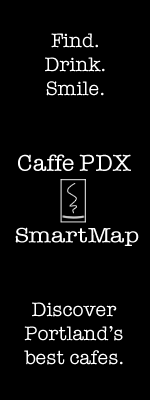Coffee Snobbery?
 Friday, October 15, 2010 at 5:41PM
Friday, October 15, 2010 at 5:41PM Today in the Oregonian’s A&E section, there was an article titled “Non-Foodie's Food Guide.” The article had a tone that mocked Portland’s “foodies,” people who have a reputation for eating only local, organic foods at non-chain restaurants. The article implied that foodies don’t go to the same places where ‘normal’ eaters go.
In addition to food, the article talks about coffee too, comparing some of the more well-known Portland roasters (like Stumptown) to Dutch Bros Coffee, a Grants Pass-based chain. The author implies that Dutch Bros. has comparable coffee and more friendly service than Stumptown. One of the Dutch Bros. franchise owners is quoted as saying “We’re trying to be a blue-collar stop. We call our big coffee a ‘large.’” (That quote reminded me of my time working at Starbucks. Once in a while, people would come into Starbucks and tell me they wanted a medium coffee but they didn’t “know how to say grande, or whatever you say here.” I used to smile and explain that I understood English too.)
The piece has received a lot of attention and comments from readers today. On one side, there are people that say “That’s right! Foodies are rich snobs who eat overpriced food and drink overrated coffee!” and there are others that say “Why would anyone go to the chains? Their stuff is garbage!” The third type of comments are those that ask “Who cares? Most of us like to go wherever we can get good food and drink at prices we can afford, and by writing this article the Oregonian is just trying to create conflict where there really is none.” I agree with the third type of comments.
However, I can imagine some of you thinking when I write about a coffee’s fruit notes and smooth finishes, it seems pretty ridiculous. In some ways I agree, but it’s not that bad if you think about coffee like if it were music. I’ll try to explain what I mean:
Most people listen to music because it makes them feel good and helps pass the time. Some people get into music a little deeper. They know their favorite band’s full catalog of songs and can sing them all by heart. They go to concerts and maybe even join a fan club.
Then there are the people who get into the art of making music. These people play instruments themselves and know the challenges that learning a new instrument brings. They marvel at the skill involved with playing the best music. Over time, they learn about chord progressions, scales and modes and why certain songs sound the way they do. The music itself becomes the obsession, instead of just enjoying how it makes them feel.
Coffee is similar. Most people drink it because it makes them feel good. Some people start experimenting with a couple different coffees and they learn that there are some kinds that they like a lot better than others. They even start to walk all over town looking for the best cafés.
Others think, “how can I make coffee as good as what I get it at my favorite café?” They read everything they can about the beverage and realize how much time and skill goes into producing the best coffee. They become intrigued with brewing technology and techniques. They start to experiment, and might even buy a small roaster. Soon, they’re obsessed with the coffee and not just the experience of drinking it.
Therefore, I don’t look at this passion for coffee as something snobbish. Instead, it is just the natural progression of people who like coffee and want to learn more about it. People are going to like what they like. Let them.
To tell you the truth, I’m just glad we can get good coffee in Portland, whether it’s at Dutch Bros or Extracto. After all, we could have the misfortune of only having what author Kenneth Davids, who wrote Espresso: Ultimate Coffee, calls espresso manqué. Espresso manqué, or failed espresso, is “all of the misinterpretations and misunderstandings of espresso being committed in the United States today thrown together, including watery, bitter, over-extracted coffee, scalded milk, meringue-like heads of froth, all presented to the background flatulence of canned whipped cream being sprayed on top of the drink to distract us from the grim reality underneath.”
You can still find coffee like that in Portland, but you don’t have to drink it if you don’t want to.



Reader Comments